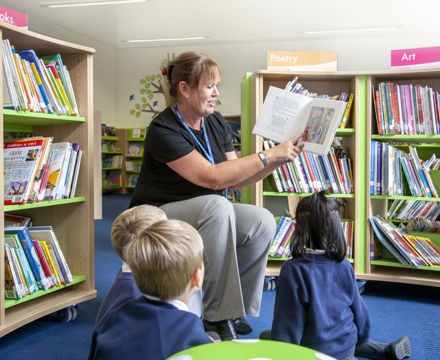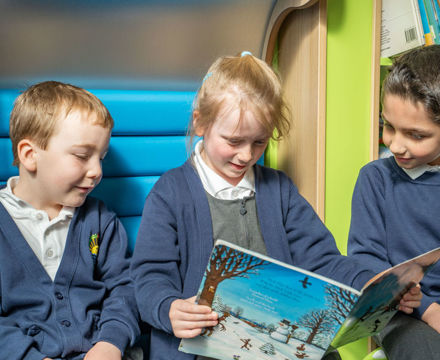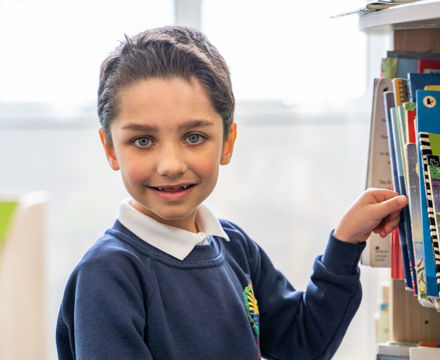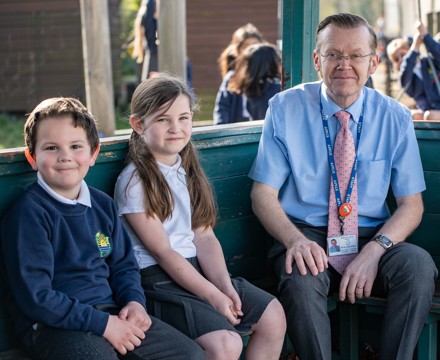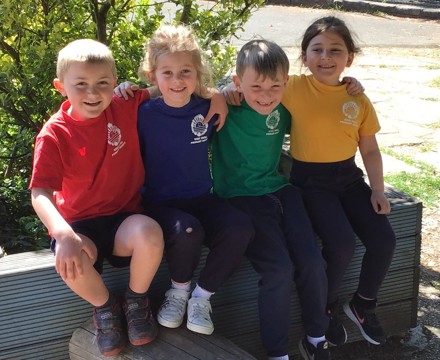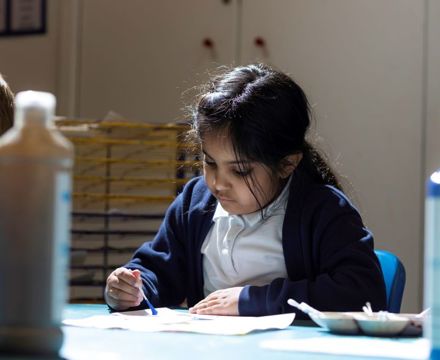Spring Term 2025
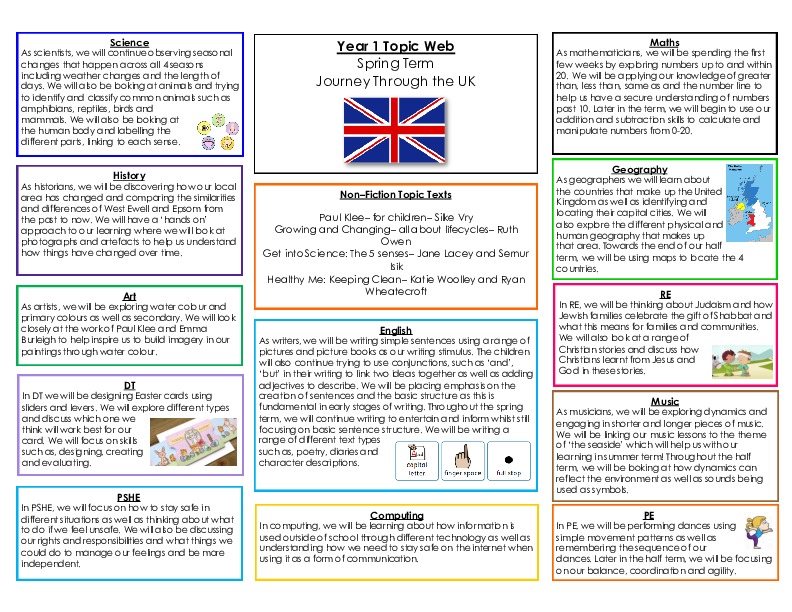
Year 1 Word Aware words for the Spring TermYear 1 curriculum overviewYear 1 Parent Information Slides 2024
Year 1 End of Year Expectations
Year 1 and 2 Common Exception words
Downloadable Phase 2, 3 and 5 Grapheme mat from Little Wandle
Year 1 Phonics Screening check information -Year 1 Phonics Screening Check Slides - updated for 2025
English
In English we immerse ourselves in exciting topics to inspire our speaking and listening, writing and reading. We use storytelling, drama and role play to bring our writing to life! Through our topics, we learn about the ingredients of a sentence and how to use punctuation. We challenge our children to use exciting verbs, adjectives and adverbs to make their writing more interesting for the reader. Writing is taught through a purpose driven model and each two week block is planned using a high quality stimulus which is based on a thematic approach. Each half term focuses on one writing purpose and skills are carefully selected to embed within the purpose unit. In Year 1 our writing purposes are to entertain and to inform. Interactive, fast-paced phonics sessions following the ‘Little Wandle' programme are taught daily to support reading, writing and spelling. Children enjoy developing a repertoire of skills to help enhance their love of reading during group reading sessions three times a week, through individual reading with their teacher, teaching assistant and volunteer readers and through library visits. We use decodable books matched to each child’s individual levels to support children’s varied learning needs.
Children are expected to be able to read and spell correctly a specific selection of ‘common exception words’; these are words that generally do not ‘sound out’ correctly using the children’s phonics knowledge.
Maths
We develop a love of maths through carefully planned, interactive and practical lessons. Following the National Curriculum and the White Rose Maths Scheme, we aim to equip children with the understanding of mathematical skills and concepts to be able to apply them confidently in a real-life context and through problem solving activities. We teach maths in mixed ability classes, in which activities are designed to challenge each child. We also offer consolidation groups for those who may need some support. Children know how to succeed and are given timely feedback and next steps in learning. We have a wide range of manipulatives available for children to choose from in order to support their learning. They are encouraged to be independent in collecting the resources they need and to persevere when solving problems.
Science
During Year 1 children learn to use practical scientific methods, processes and skills. These include making observations, performing simple tests and gathering and recording data to help in answering questions.
They will explore animals, including humans, plant and trees, seasonal changes and materials. We encourage our children to be inquisitive and curious about the world around them and to ask questions to extend their knowledge and understanding.
Spiritual, Moral, Social and Cultural Development (SMSC)
SMSC is embedded throughout our curriculum and school values. As a whole school we develop British values through our five school values of resourcefulness, resilience, reflection, responsibility and respect. We teach these through assemblies, weekly circle times and school council. We promote the British value of democracy through having class representatives on our school council. In Year One, we aim to foster within each child, a sense of enjoyment and excitement in learning about themselves, others and the world. We use our outside learning environment and exploration of the local area to enhance our curriculum and create a sense of belonging. In weekly RE lessons we encourage reflection on our own beliefs and the beliefs of others. We regularly spend time considering and understanding the consequences of our own and other people’s behaviour and actions, including understanding bullying, using circle time, role play and puppet work. This is reinforced by celebrating positive behaviour choices through class reward systems, golden board, golden tea party and celebration assembly.
Top Tips for Year 1 Parents
- Look for opportunities to talk about numbers. If you see numbers, can your child read them? What is the next number, or the one before? Use vocabulary of more/less/fewer/most/fewest. Encourage adding by counting on in their head, counting in 2s, 5s and 10s forwards and backwards. Try to involve word problems in everyday situations. E.g. If I have this pizza and it needs to be cut into quarters and I have 12 toppings. How can I fairly share out the toppings?
- Share books with your child – read to them and talk about the story. Discuss what you like/dislike about the books. Try to use a selection of questions to encourage the child to infer from the text. (Make a presumption of what the answer could be based on the information given ) E.g. Did Callum do the right thing? What makes you think that? How did everyone feel about the decision he made? If the decision was the opposite, what might have happened?
- Reading every day for 5 to 10 minutes – regular reading practice is vital to support their progress. Those children who read every day are more likely to become confident readers by the end of Year 1 giving them a solid basis for their future learning.
- Help your child to practise reading and spelling the first 100 High Frequency words at speed. If they can recognise them on sight, reading fluency will be greatly improved.
- ‘Gimme 5’ – strategies for reading unfamiliar words.
- Think about it – does the word they said make sense?
- Look at the picture – What is happening in the picture that can give a clue.
- Sound it out – this works well as long as it is not a ‘tricky’ word.
- Go forward – miss out the tricky word and carry on reading the rest of the sentence. Can you think of what might make sense in the gap?
- Go back – Go back and re-read the sentence – this helps them to make sense of what they have just read.
- Encouraging correct tripod pencil grip – the more a child holds their pencil correctly, the more natural it will be to them.
- Encouraging correct letter and number formation when writing at home. If they reverse some letters ask them to re-write it 5 times to develop fluency in writing the letter and hopefully encourage them to get out of the habit.
Homework
You can find our KS1 and KS2 Homework Policy here.
Our approach to homework is one where we believe that homework should complement our learning in school and not be a stressful experience at home.
Parents are key educators in their children’s lives and have a critical influence over the success of children’s learning. We suggest that in the early stages of a child’s school life at least 10 minutes is set aside each day to talk to your child about their learning, to read with your child, play games and develop their self-help skills.
As your child moves through the Primary phase they will begin to have more formal tasks such as learning multiplication tables and spellings, projects; and be expected to work for longer periods and with increasing independence.
Homework can also be a walk in the park, a swimming trip, baking, an art activity, visiting family.
For the full version of the spelling lists, please click on the following link:
To find out more about the curriculum we follow, please click on the following link:


